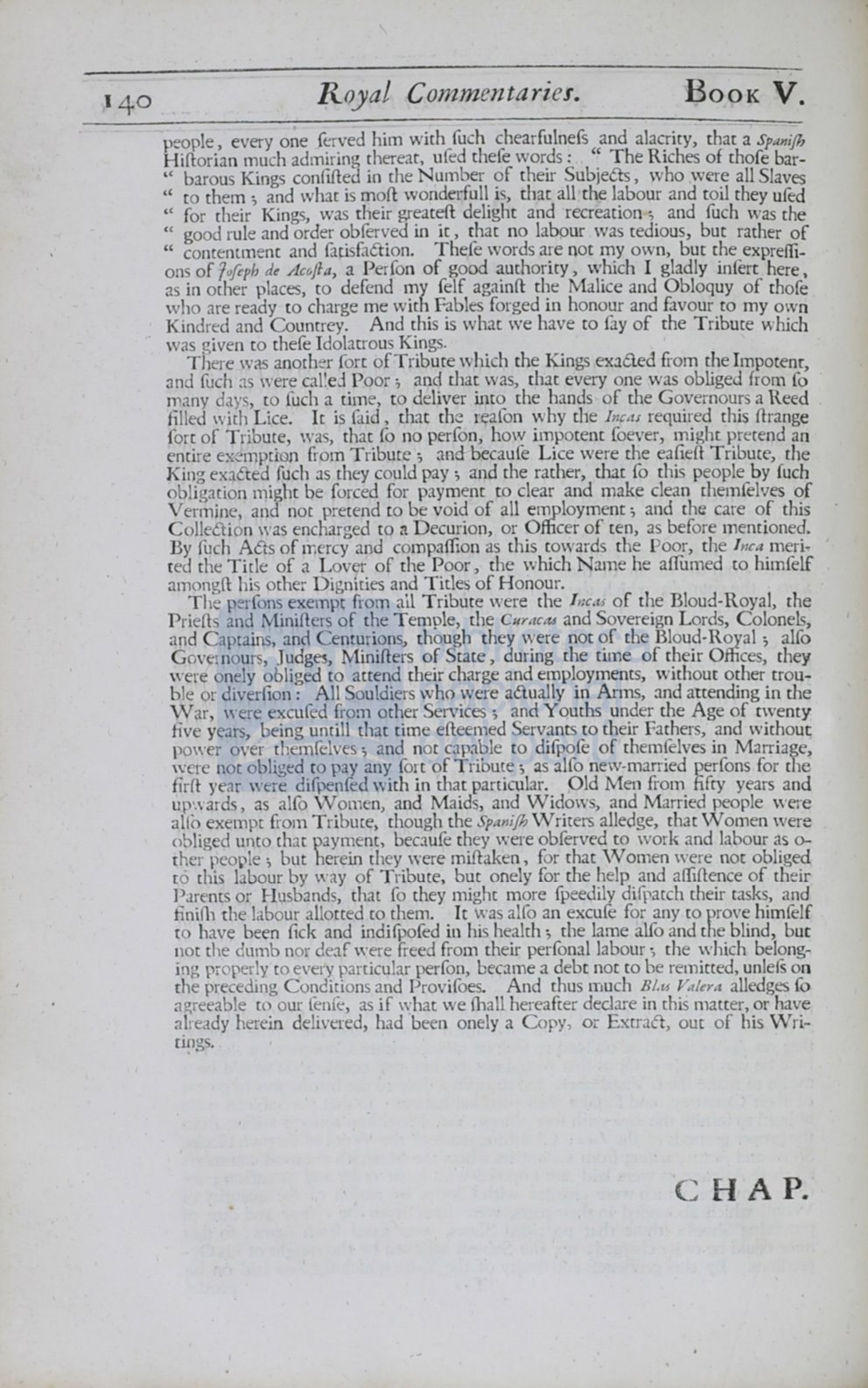

140 .
Royal
Commentaries.
BooK
V.
people > every one ferved him with fuch chearfulnefs and alacrity, that a
Spanifh
Hifl:orian much admiring thereat, u[ed thefe words·
'' The Riches of thofe bar–
,c
barous Kings confilled in the Number of their Subje&,
ho
w~re
all
Slaves
'' to
them ; and what is mofl wonderfull i , that
all
the labour and
roil
they
ufed
'( for
their
Kings,
was
their greate!l: delight and recreation ; and fuch
was
the
a
good
rule
and order obfervea
in
it> that no labour wa tedious, but rather of
" contentment and facisfaction.
Thefe words are not my own> but the expreffi–
on of
{ofeph de Acofta>
a Perfon of good authority, which
I
gladly
inferr
here,
as in other
laces, to defend
my
felf againfr the Malice and Obloquy of thofe
ho are ready to charge
me
with Fables forged in honour and favour to my own
Kindred and Coumrey. And this is what we have
to
fay of the Tribure which
was
iven
ro
thefe Idolatrou Kings.
There
was
aomber fort ofTribute' hich the
Kings
exaCled from the Impotent
and Cuch as were caLed Poor ;
and
that
as> th t every one
was
obliged from
f~
many da)
to
fu
h a time,
to
deliver
into
the hands of the Governour a Reed
filled with Lice.
It
is
faid, that the n;afon
hy the
lnctu
required this firange
fort
of Tribute, wa , that
fo
no perfon, how impotent foe er, might pretend
an
entire
e
~mpti
from Tribure ;
a-ad-
becaufe Lice vvere the eafiefi Tribute, the
King exacted fuch as they could
pay;
and the rather, that
fo
chi
people by
fuch
bligation might be forced for payment
to
clear and make clean rhemfelves of
ermine, and not pretend
to
be void of all employment ;
and
th~
care of this
ollectioo \
1
as
encharged
ro
a
Decurion> or Officer of ten, as before mentioned.
By
fuch
Alts of
m
rcy and compaffion as this
cov ard
the
oor, the
I nca
meri–
ted the Title of a Lo
er
of the Poor, the which
N
me he affumed
to
himfelf
amongfr
l
i
other
Dignities and Titles of Honour.
The
0
rfons exempt from ail Tribute \'\
1
ere the
l ncM
of the Bloud-Royal, the
Priefi and Miniflers of the Temple, the
Curactu
and Sovereign Lords, Colonels,
and C aptains, and Centurions, though they
ere not of the Bloud-Royal ; alfo
Go
ernours, Judge5, Minifl:ers of rate, during the time of their Offices, they
we ·e onely obliged to attend their charge and employments, without other trou-
le
or diverfion :
All
Souldiers who were aClua1ly in
Arms,
~md
attending
in
the
"!\/
ar were excuu d from other Services :,
and
Y
ouchs under the Age of twenty
five year , being unrill that time efieemed ervants
to
their Father , and \ ithout
ower over themfel es:, and not cJpable
to
difpo[e of thernfelves
in
Marriage,
" -' r
not obliged
to
ay any
fort
of Tribute; as alfo new-married perfons for
the
firfl:
~ear
were difpenfed \ ith in that particular. Old Men from
fifry
years and
u '·' ard , as
alfo
on en, and Maids, and Widow , and Married people
\~:ere
alC
xempt
fr
m
Tribme> though the
panifh
Vvriters alledge, that Women were
obliged unt
that payment, becaufe they \'V'ere ob[erved
to
work and labour
as
0-
th
r
peo
e ;
but herein they were mi!l:akeo, for that
Vv
omen \vere nor obliged
ro chi
I
bour by
\Nay
of Tribute, but onely for the help and afflll:ence of their
Parent or Husband , that
[o
they might more fpee
ily
difpat
h
their tasks,
and
tini01
the labour allotted
t0
them.
It
was alfo an excufe for any to
pro
e himfelf
r
have been
fick
and indifpofed
in
his health; the lame alfo and the blind, but
not the
um nor deaf "'''ere freed from their perfonal labour; the which belong–
in
properly
toe
ery particu ar erfon> became a debt not
to
be remitted
unle~
on
the prec ding Conditions and Pro ifoes. And thus
I
uch
Bl.u Valera
alledges
fo
agreeable
t
our
[en[e,
as
if
\\:hat we fhall hereafter declare in
th· matter,
or have
already
her
in
delivered,
had been onely a
o
y,
or
Extra
, out
of his
ri–
ri
g.
P.














